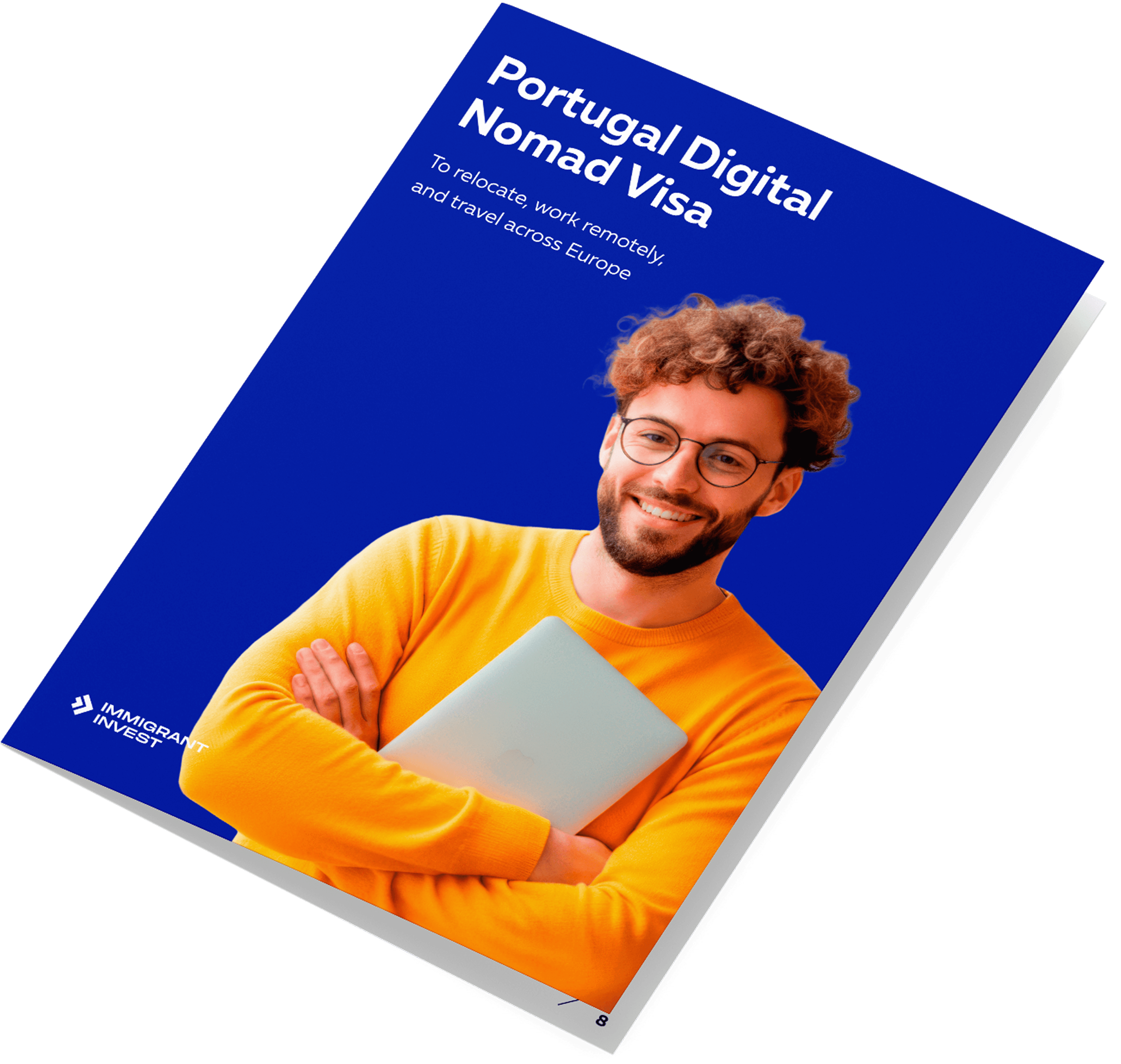Experienced
Being in the industry since 2006, we can provide Digital Nomad Portugal legal help — from Due Diligence to investment — and resolve issues fast.
Updated on January 12, 2026
Residency in the country by the ocean for relocation to the EU and travel around the Schengen Area visa-free
€3,680+
Monthly income
6+ months
Visa obtaining period
2 years
RP validity
The Portugal Digital Nomad Visa is for remote workers, including freelancers, entrepreneurs, and employees of foreign companies. It is available only to non-EU and non-EEA citizens.
Applicants must prove a monthly income of at least €3,680 and have housing in Portugal. The visa allows a 2-year residence permit, renewable for 3 more years, provided the holder lives in Portugal.
1
With a Digital Nomad Visa, applicants can move to Portugal with their families and get residence permits there.
With a Digital Nomad Visa, applicants can move to Portugal with their families and get residence permits there.
2
Digital nomads with Portuguese residence permits can travel visa-free to other Schengen countries and spend up to 90 days out of 180.
Digital nomads with Portuguese residence permits can travel visa-free to other Schengen countries and spend up to 90 days out of 180.
3
After 5 years of residency, digital nomads can apply for citizenship providing they meet naturalisation and language requirements.
After 5 years of residency, digital nomads can apply for citizenship providing they meet naturalisation and language requirements.
4
Residents get free education in public schools and universities, with globally recognised diplomas, and have equal access to medical care.
Residents get free education in public schools and universities, with globally recognised diplomas, and have equal access to medical care.
5
Digital nomads must open a Portuguese bank account and transfer their savings to qualify for residency. Local and international banks offer multi-currency accounts for easy transactions.
Digital nomads must open a Portuguese bank account and transfer their savings to qualify for residency. Local and international banks offer multi-currency accounts for easy transactions.

Step-by-step procedure
Requirements for applicants
Required documents
Answers to frequently asked questions
The spouse or partner, children, and parents can get Portuguese residency with the main applicant
The Digital Nomad Visa cost depends on the number of applicants and the type of real estate — rented or purchased.
Rent of real estate
Any type of residential property can be rented, including apartments, townhouses, and villas, with no minimum rental price.
Purchase of real estate
Any type of residential property in Portugal can be purchased, and there is no minimum price requirement.

The total cost depends on family composition. We can provide a free, individualised calculation for your case, covering additional expenses like taxes, insurance, and more.
Compare the key terms and benefits of the Portuguese D8 visa with other options for digital nomads in the EU.
Obtaining the Portugal Digital Nomad Visa is a structured process that, in practice, can take several months. Based on Immigrant Invest’s experience, applicants should be prepared for a timeline of around 6 months or more.
Below is a step-by-step guide that outlines the Portugal Digital Nomad Visa requirements and explains how the application process usually works.
1 day
Preliminary Due Diligence
Immigrant Invest conducts a preliminary check of the digital nomad before concluding an agreement. A certified Anti-Money Laundering Officer checks information in international legal and business databases.
The check helps discover the facts that may affect obtaining a visa and residence permit in Portugal and reduce the risk of refusal. For example, providing additional documents or choosing another program may be necessary.
The preliminary Due Diligence is confidential and takes 1 business day.
Pass a quick test and learn the nuances that can prevent you from obtaining a residence permit.
2+ weeks
Collecting documents and getting a taxpayer number
Immigrant Invest lawyers help the applicant to gather necessary documents and obtain an individual taxpayer number, NIF.
The applicant needs a taxpayer number to rent or buy real estate and open an account in a Portuguese bank.
Non-EU citizens may obtain a NIF remotely through a Portuguese tax representative. Immigrant Invest facilitates this process with the use of a power of attorney.
Up to 2 months
Purchasing or renting housing
Immigrant Invest real estate experts offer properties for rent or purchase. The applicant picks a property remotely or travels to Portugal to see the options in person.
Buying a property takes up to 1 month. Renting is faster and takes only several days.
3+ weeks
Collecting and submitting documents for a Digital Nomad Visa
Immigrant Invest lawyers help applicants collect the necessary documents, fill out forms, and check them.
Digital nomads submit documents and biometric data to a Portuguese consulate in the country of residence.
3+ months
Obtaining a Portugal Digital Nomad Visa
The Portuguese Consulate processes the visa application within at least 3 months. The digital nomad receives a passport with a visa sticker, which indicates the date of the visit to the Agency for Integration, Migrations and Asylum, AIMA, to apply for a residence permit.
If the consulate has not set a date for a visit to the AIMA, the digital nomad needs to sign up personally or with the help of a representative, such as an Immigrant Invest lawyer.
Within 4 months
Getting a residence permit card
The Digital Nomad Visa is valid for 4 months. The applicant needs to come to Portugal and apply for a residence permit to the AIMA at an appointed time and day. An Immigrant Invest representative accompanies the applicant.
After the application is approved, a residence permit card is sent to the applicant’s registered address in Portugal.
The first residence permit is issued to digital nomads for 2 years. It can be extended for 3 more years if the digital nomad proves they have spent at least 1.5 years in a row or 16 months in total in Portugal within 2 years of holding a residence permit.
Renewal of the 3-year residence permit or applying for permanent residency or citizenship is possible if the digital nomad has spent 2.5 years in a row or 28 months in total in Portugal within the 3 years with the second residence permit.
Immigrant Invest offers Digital Nomad Portugal legal help to obtain the D8 visa. We are well-versed in all migration specifics and strictly follow the legal framework, including Article 53 of Law No. 23/2007.
We are also government-licensed to represent investors in Malta, several Caribbean countries, Vanuatu, and São Tomé and Príncipe. Our membership in the Investment Migration Council, the leading global association for industry experts, further reflects our commitment to the highest standards of integrity.
Experienced
Being in the industry since 2006, we can provide Digital Nomad Portugal legal help — from Due Diligence to investment — and resolve issues fast.
Diligent
Our in-house compliance team runs thorough checks upfront to ensure eligibility and protect you from rejection risks.
Dedicated
From the first consultation to obtaining residency, we will support you at every step and answer all, even the trickiest, questions.
Confidential
We protect your trust with strict confidentiality, securing your data and investment details under an NDA agreement.

Elena Ruda,
Chief Development Officer at Immigrant Invest
With almost 20 years of experience, direct partnerships, and local presence in Portugal, we ensure a smooth, secure, and transparent journey to EU residency.
Our team of legal and real estate experts will assist you at every step, from the first free consultation to selecting a property and securing your residency.
Our Portugal-based legal and migration experts know the law inside out and ensure a smooth residency process.

Our on-site team stays ahead of legal changes, prepares only required documents, offers in-person support, and ensures smooth coordination with Portuguese authorities.

We will help you obtain residence permits for family members, including your spouse or partner, children, and parents.

We will remind and help you renew your residence permit and apply for permanent residency or citizenship.

We will offer property options for rent or purchase based on your goals and budget.

We will assist you in preparing the required documents and opening an account in a Portuguese bank.

Our on-site team stays ahead of legal changes, prepares only required documents, offers in-person support, and ensures smooth coordination with Portuguese authorities.

We will help you obtain residence permits for family members, including your spouse or partner, children, and parents.

We will remind and help you renew your residence permit and apply for permanent residency or citizenship.

We will offer property options for rent or purchase based on your goals and budget.

We will assist you in preparing the required documents and opening an account in a Portuguese bank.
Clients’ names and photos have been changed to comply with a non-disclosure agreement.
Schedule a meeting
Schedule a meeting at one of the offices or online. A lawyer will analyze the situation, calculate the cost and help you find a solution based on your goals.
Prefer messengers?
Watch our breakdown of the benefits and timeframes to get a full picture of the D7 visa in just under 2 minutes.
Country and statusInvestmentsTime requiredBenefits
Schedule a meeting
We will develop an individual solution, select a country and status that will solve your problems, and accompany the entire process.

Head of the Austrian office
Prefer messengers?